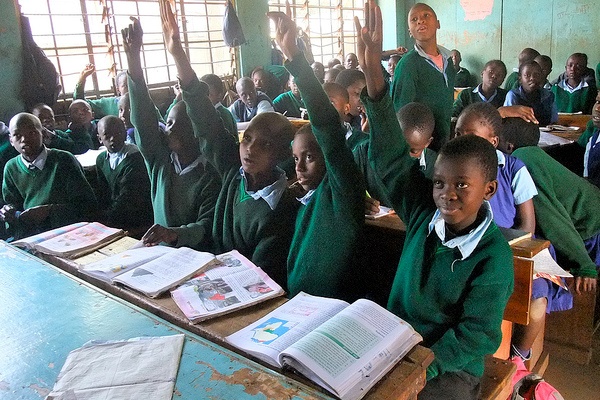
KPA Chairman, David Waweru, told the IPA: ‘Since VAT was introduced, we have seen a downturn in the entire publishing industry. There are publishers whose volumes have gone down as much as 50%, but the national average is about 35% in sales since 2013.’
For years, the KPA had fought successfully to keep books VAT-free, before the government finally imposed the 16% levy in September 2013.
Waweru says that VAT on books has sent legitimate sales plummeting and simultaneously driven piracy up so far that it is now ‘the bigger economy than the legitimate publishing industry’. He also said there is evidence that some “rogue” booksellers are selling pirated books to schools at lower, VAT-free prices.
The pirated book market in Kenya is now bigger than legitimate publishing
Education Cabinet Secretary Fred Matiang’i recently announced plans to reform and centralize the nation’s textbook distribution system, which he described as being beset by ‘accountability issues’.
Citing a woeful 5:1 student-to-book ratio despite heavy state spending, Matiang’i’s proposal provides that school directors continue to manage funds for buying textbooks, while title selection, procurement and distribution will be the Education Ministry’s responsibility.
But the KPA says this plan will not tackle the rampant book theft and embezzlement that is denying schoolchildren, especially those in remote areas, access to the books they need.
Waweru said: ‘The Kenyan bookselling business is unregulated. Money going to schools has led to corruption and some head teachers colluding with rogue booksellers who end up not actually supplying the books, although money still changes hands.’
Waweru believes the Matiang’i plan would be a return to the disastrous system that was in place between 1975 and 1984 under the Kenya Schools Equipment Scheme. It would deliver a catastrophic blow both to educational performance and Kenya’s wider reading culture, he said, since centralized textbook selection and procurement would ‘kill the entire book distribution chain’.
‘Non-educational books will also become very difficult to access and, with a centralized system, even if books do end up reaching the schools, what happens when schools want to buy other books not supplied during the first term? They’d need to go to a bookshop and choose them. For the long-term goal of developing a reading culture in Kenya it is critical that we have a properly functioning bookselling chain.’
The KPA advocates an approach whose first priority is to beat corruption by introducing checks at every link in the supply chain.
Under their scheme, funds would not go to schools but would be retained by the Ministry of Education. Schools would select the titles, and the books would only be bought from a list of sellers that are approved by the Ministry on the advice of publishers, ‘to weed out the rogue booksellers’.
Waweru believes that book orders processed via a centralized system tied to the subscription-based e-learning system called the Kenya Education Cloud that is currently being rolled out, will tackle corruption and piracy at a single stroke, since it will remove money from the equation.
The Ministry of Education would pay the publishers and booksellers directly, but only once the book supplier has delivered the order. Thereafter, government monitoring would be required to ensure the books are not removed from the school, Waweru added.
‘Our solution will deal with piracy, firstly because booksellers will be prequalified. Secondly, it will be possible to track goods between ordering, delivery and supply. Dealing with piracy will hopefully bring back greater health to the publishing industry. And finally, our campaign on sanitizing book procurement and supply is tied to our VAT campaign – we’re lobbying government this budget cycle to remove VAT on books.’
David Waweru: “VAT undermines the overall goal of providing quality of education … The long-term consequences will be very, very serious.”
That lobbying is built on the argument that VAT undermines the overall goal of providing quality of education, since, according the Kenyan Ministry of Education’s own figures, public school results have been steadily falling in the last three years. Conversely, students in private schools, which manage their own book purchases, are doing better and better.
‘If you look at the national exam results of the last two years, it shows that in public schools there has been a decline each year in performance. Significantly, the worst performed subject is English language and the worst performed paper is English composition, and it’s all pointing towards the fact that pupils don’t have access to books and aren’t reading. The long-term consequences will be very, very serious.’
This week, the IPA sent a letter to Kenyan Education Cabinet Secretary Fred Matiang’i, supporting the KPA’s position and detailing the positive medium- and long-term social, cultural and economic impact of a zero-rate VAT on books.
The KPA is hopeful that when the Kenyan Treasury announces its budget, on 15 June, it will include the decision to scrap VAT on books.

